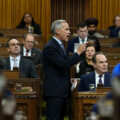Corporate Canada enters 2024 in an anxious mood about the federal political landscape.
Given where the polls are, executives are naturally beginning to map out—as best they can—what federal regime change would mean for their business.
Some may want a new government, and some may not. But everyone has a fiduciary duty to prepare.
The business community’s relationship with the Trudeau government has always been testy, and there’s fatigue with its practice of layering on new regulations on top of old—from climate to labour. There’s also worry about tax creep, with federal revenue from corporate income hovering at the highest since the early 1970s as a share of GDP.
But the Liberals have delivered big time on key demands of corporate Canada—child care, looser immigration and subsidies for green investment.
Everyone knows there won’t be much love lost between Bay Street and Poilievre, even if some executives would welcome a less high-handed and overbearing approach to government.
The focus on affordability will be a challenge and there are long memories in C-suites of Stephen Harper’s emphasis on consumer issues. No one is expecting a honeymoon.
And now, there’s a new wrinkle: Poilievre’s flirtation with organized labour.
It was a difficult year on the labour front for business in 2023, particularly for goods-producing sectors that are already in the middle of a technical recession. (In aggregate the economy has only stalled thanks to growing activity for services.)
Tough talks
Companies are facing emboldened unions and wage negotiations have been tough. At the same time, businesses want to be accommodating to their workforce for fear of losing experienced and skilled labourers who continue to be in short supply, making employers more open to concessions.
Since May, annual wage settlements have averaged 4.3 percent, more than double the average over the past 30 years.
The number of person days not worked due to stoppages hit 2.2 million in the first nine months of 2023—putting us on track for the worst year of labour disruptions in Canada since 2005. They called it the ‘summer of strikes’ for a reason.
This is the broader economic context through which business is looking at Poilievre’s overtures to labour.
These pressures, meanwhile, are surfacing at a time when employers are dealing with a slew of new labour-friendly legislation that is weighing on industry.
This includes, for example, the requirement to provide 10 days of paid sick leave for all federally regulated workers, which came into effect a year ago.
The latest initiative is the government’s bill to ban replacement workers during contract disputes, currently moving through the House of Commons.
Business groups have warned the bill will increase the length and number of labour disputes in the country. Poilievre has been silent on the legislation so far, saying he needs to study it first before taking a position.
Being frank
However, he wants everyone to know he blames inflation (and Trudeau) for causing the labour unrest and stoking wage demands.
“Frankly I don’t blame workers,” he said at a press conference last month.
It’s not exactly comforting to a corporate Canada that is facing a serious challenge.
A disconnect between wages and productivity is emerging as one of the biggest risks to the nation’s economy going into 2024.

The latest quarterly data on productivity and labour costs were released on December 6th, and the numbers show a hot mess.
Labour productivity continued its downward trajectory in the third quarter. It was down 0.8 percent during the three-month period and has fallen six straight quarters and 12 out of the last 13.
Falling productivity coupled with strong wage gains is a deleterious cocktail. It means costs to produce stuff are surging.
For example, the same data shows unit labour costs are up 6.1 percent from a year ago—which would have been the fastest in three decades in the pre-pandemic era. It’s also above the four-percent pace of unit labour cost increases in the U.S., adding a competitive headwind for our businesses.
Higher costs mean inflationary pressures will persist, and our global competitiveness will suffer.
If Poilievre wants to bring down inflation without leaning against wage gains, he’ll need to figure out a solution to Canada’s productivity morass. Good luck with that.
Recommended for You

The year we cure Gell-Mann Amnesia: The Hub predicts 2026

Canada will fall short in combatting hate, and an American team will win the Stanley Cup: The Hub predicts 2026

The collapsing birth rate becomes front-page news, and a long-foretold financial crash? The Hub predicts 2026

Strongmen and joblessness will rear their ugly heads: The Hub predicts 2026




